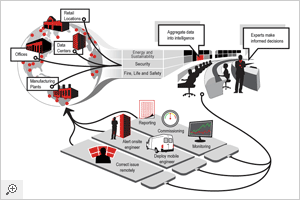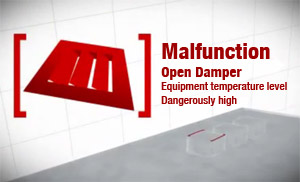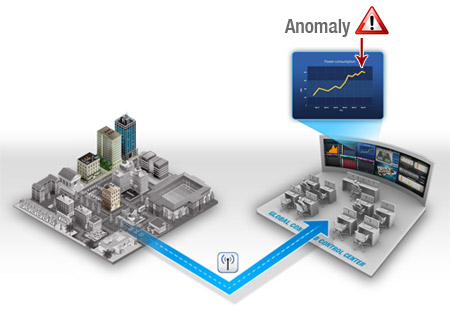
Press Releases

It's 5:00 a.m. - Do You Know What Your Buildings Are Up To?
Author: Christopher Browne, International Director of Integrated Facilities Management, Jones Lang LaSalle
Jan 19, 2012: It's 5:00 a.m. and all is not well in a data center at the base of the Cascade Mountains outside Seattle. Energy cost overruns and customer service failures are imminent, as an open damper is about to cause equipment to overheat and shut down, depriving thousands of consumers access to customer service. The equipment shutdown could be a serious problem - but instead you and your team are sleeping soundly. Your cloud-based, internationally centralized building management system has identified the anomaly, diagnosed the problem, and adjusted settings to resolve it.

Commercial buildings still have a long way to go when it comes to adopting smarter systems for gathering real-time performance data. However, the real estate industry is making swift progress toward the more widespread use of intelligent off-site facility management systems. As technologies improve, so does the opportunity to save time, energy and money on operational services. Facilities managers all over the world are looking for more advanced, cloud-based solutions that combine smart building technology, advanced engineering and centralized operational services to more efficiently manage their real estate portfolios. By using this type of this method for portfolio-wide data and property management, new buildings can live up to the standards of efficiency predicted by those who developed them - and existing buildings can reach higher levels of operational efficiency than if they were managed solely by an on-site team.
Crisis (or Not) in the Cascades

Now let's go back to that 5:00 a.m. temperature spike, resolved before it became an operational failure or a crisis. Come 9:00 a.m. that day, calm and well-rested, the corporate real estate manager reviews incoming reports from across the world. It appears that temperatures were rising not just in the facility in the Cascades, but also coincidentally there was a similar problem in Singapore as a heat wave approached the city. While an individual building manager might resolve the problem by turning up the air conditioner overnight, an intelligent building system, controlled by a few managers at a command center, could keep the building's temperature comfortable while gradually increasing air conditioning levels, thereby saving energy. The needs of that industrial real estate in Seattle and the office building in Singapore may be as different as night and day, but the system manages them each to the greatest efficiency.
A truly intelligent, remotely operated building management system controls more than just HVAC. For example, on top of the crisis in the Cascades and the cost savings opportunity in Singapore, a building automation system would also have reported that a compressor was about to fail at a German assembly plant - a major problem that could cost thousands of dollars in lost productivity if the production line were to be shut down. Deployment of predictive analytic technology anticipated the pending failure and alerted on-site engineers, who were able to make timely repairs and avert a very expensive problem. In addition, remote building automation systems can alert managers to whether a system is operating to its highest efficiency - not just whether or not it is broken - allowing slowdowns to be fixed before a system breaks completely.
Data Buffet
Let's go back to the corporate real estate manager responsible for properties around the world. As you drink your morning coffee, you review not only the overnight reports, but also the longer-term data at your disposal. Understanding the long-term building metrics and data can help portfolio managers predict potential problems and instruct building engineers and maintenance staff on how to preemptively fix them. During the past month, several of your U.S. facilities have been experiencing sporadic temperature spikes that could harm essential IT equipment, and are definitely increasing energy costs. Recognizing regional, national or worldwide trends can help your management team alert the on-site engineers in the affected properties and recommend steps for addressing the problem, thus reducing the operational risk while improving energy efficiency across the portfolio.
Global remote control, other new technologies maximize building efficiency
From cloud computing to robotics, innovative technological breakthroughs enable corporate real estate managers to pursue smart building strategies as never before. One new system, Jones Lang LaSalle's IntelliCommand powered by Pacific Controls, is now in use via several command centers around the globe, providing 24/7 data without keeping portfolio managers up all night. These systems use algorithms to analyze the data and spot trends, patterns and anomalies to be resolved in real-time.
One key element of such systems is improving building efficiency across all industry and asset types, including office buildings, manufacturing and lab facilities, hospitals, data centers and retail locations. Because it provides comprehensive, precise and actionable data to inform strategic capital planning and deployment, centralized, intelligent building automation systems can also help corporate real estate teams make the informed investment decisions that improve portfolio performance. Several building automation providers are now using software robots to complete a variety of tasks on buildings worldwide, with or without a building manger present. Now, software robots can adjust temperatures, open and close vents, clean mechanical systems, or reconfigure connections within a building. Command centers can control these robots through the cloud, so whether it's 3 a.m. or 3 p.m., a building can be safe, comfortable and efficient for its occupants.
Watch our video to learn how IntelliCommand can help you achieve unprecedented efficiency and productivity across your portfolio.
Energy efficiency, sustainability improvements help systems pay for themselves
Just as real estate owners and operators demanded bottom-line results from green buildings when they were a new trend, smart building systems are expected to pay for themselves as well. Jones Lang LaSalle reports that energy savings alone are estimated at 18 percent within 18 months of implementation. This estimate is based on the company's experience providing services to more than 250 major corporations totaling 1.8 billion square feet of real estate globally. In addition to energy efficiency, buildings are also achieving cost savings through fewer lapses in operational capacity and more accurate and efficient building repairs.
Your buildings are talking - and now you can hear them

Portfolio managers can now use remotely-controlled building automation systems to centralize data generated by individual buildings and to provide portfolio-wide analyses. These systems enable individual properties to automatically resolve their operating inefficiencies without requiring hands-on attention. Not only are building issues resolved more quickly than would be possible with manual interventions, these intelligent systems can significantly reduce energy costs and lower facility management costs over time. Isn't it time you started listening to your buildings?
Advantages to cloud-based, remotely-controlled facility management systems:
- Identifies anomalies in building systems that might otherwise go unnoticed until they become significant expenses.
- Provides continuous commissioning, constantly monitoring all systems to ensure they are within parameters for optimal operating conditions.
- Monitors worldwide portfolios from a central location to allow immediate response where and when it is needed.
- Diagnoses possible causes of an issue, so that energy and facility professionals can show up with the right tools and equipment to make repairs efficiently if needed.
Take Command
And all that can be reviewed over your morning coffee. As you evaluate the corporate real estate services and technology that can help your company increase the value of its investment in its corporate real estate, a centralized command center may make sense for your portfolio.
About the Author
Christopher Browne is the International Director of Integrated Facilities Management at Jones Lang LaSalle, and played a leading role in developing the IntelliCommand system.
Connect with Chris at chris.browne@am.jll.com
